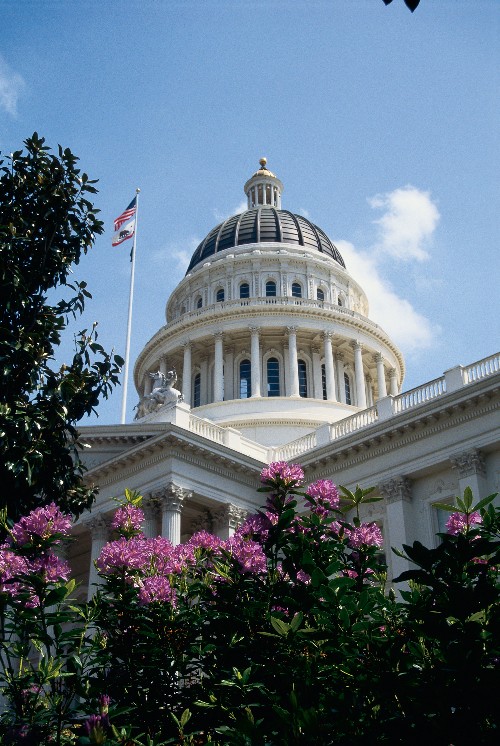California Passes Landmark Corporate Climate Transparency Bills
SB 253 and SB 261 would be first-in-the-nation laws meant to pull back the curtain on emissions and climate risks.

After a hard-fought battle, the California Legislature passed the second of two nation-leading corporate climate accountability bills yesterday afternoon. The bills, SB 253 and SB 261, are important transparency measures that would, for the first time, allow Californians to meaningfully assess the carbon footprint of thousands of companies—and what those companies plan to do about the climate-related risks they face.
What do the bills do?
SB 253, authored by State Senator Scott Wiener, would require any company with over $1 billion in total annual revenue that does business in California to disclose three categories of greenhouse gas emissions:
- Scope 1 emissions, which are direct emissions from sources a company owns or controls, like on-site fuel combustion;
- Scope 2 emissions, which are indirect emissions from heating, cooling, steam, and consumed electricity that a company purchases; and
- Scope 3 emissions, which are indirect upstream and downstream emissions from sources the company doesn’t directly control but that are related to a company’s operations, like goods and services the company buys, employee commutes or travel, and emissions related to a product’s use after it is sold.
The required disclosure of Scope 3 emissions is the piece that has prompted the most opposition among business interests, with groups like the California Chamber of Commerce complaining that there is no way to accurately track such emissions. The Chamber and others also knocked the bill for imposing serious cost burdens on businesses without actually reducing emissions.
Do these claims hold water? It’s true that the bill won’t, itself, reduce corporate emissions. But it will shine a bright light on the fact of those emissions, allowing consumers to take companies to task for failure to follow through on climate pledges like “net zero” claims. Making this information available to consumers will create a stronger incentive for companies to match their deeds to their words when it comes to climate and will give consumers the power to better align their purchases with their climate values.
As for the argument that reporting these emissions is just too challenging and costly for businesses, the existence of similar disclosure standards in the EU and UK belies that position. Many of these companies are already undertaking some form of Scope 3 emissions accounting, and what’s more, SB 253 wouldn’t impose penalties on regulated businesses until 2030, giving the business world plenty of time to figure out how to more accurately measure and report this data. Indeed, a number of large companies came out in support of the bill this week—including Apple, IKEA, and Microsoft—indicating that at least some large businesses think they’re up to the task of emissions reporting.
State Senator Henry Stern’s SB 261, relatedly, would require any company with more than $500 million in total annual revenue that does business in California to report its climate-related financial risk as well as measures it will take to reduce or adapt to that risk. Reporting would begin in 2026 and would continue every two years thereafter, with the information to be made publicly available online.
Both bills would complement a federal rulemaking process at the U.S. Securities and Exchange Commission, which has been ongoing since March 2022. That rule would require publicly traded companies to disclose climate-related financial risk, as well as information about Scope 1 and 2 emissions, and, in some cases, Scope 3 emissions as well. But the California bills go farther than the SEC rule, both in requiring disclosure of Scope 3 emissions across the board and in their application to all, rather than just publicly traded, companies above the revenue threshold.
What’s next?
Now that the bills have passed, they move to Governor Newsom’s desk, and he has about a month to sign or veto them—or take no action, in which case they’d become law. Thus far, the Governor’s office hasn’t commented on whether he’ll sign the bills. But he should.
The bills are rightly being celebrated as nation-leading efforts to provide consumers and investors with much-needed transparency. The marketplace abounds with businesses claiming to be climate-friendly; their customers deserve to be able to check under the hood. Similarly, the public should have the tools to easily understand the climate-related risks businesses face, and what is being done about them. And businesses themselves will benefit from having to meaningfully engage with mitigating or adapting to climate-related risk.
State regulators, too, will benefit from this information. Collecting and understanding this data will help the state better chart its path toward its ambitious climate goals, align the state’s purchasing power with its climate objectives, and ensure that companies doing business in California are grappling with their climate impacts and climate risks to their businesses.
California has the opportunity to uphold its reputation as a global leader on climate by making SB 253 and SB 261 law—let’s hope it does.
Reader Comments
One Reply to “California Passes Landmark Corporate Climate Transparency Bills”
Comments are closed.







Great article! I agree with you. Everyone complained about AB 2588 (Air Toxics Hot Spots) when it passed for the same reason – that it was just a reporting requirement and would create significant financial burden to implement but it was very effective in pushing many companies to voluntarily reduce their air toxics emissions in order to avoid disclosing how large their emissions were.